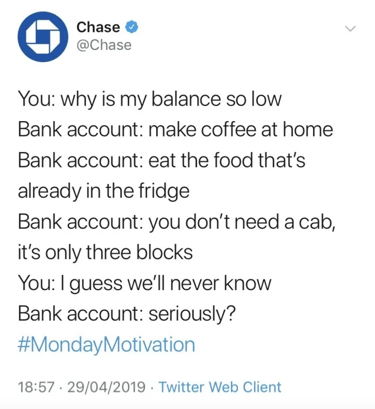Chase, Don’t Quit Your Day Job
5/2/20193 min read


This week in tone-death tweets, Chase Bank takes the cake. In an attempt to appear relatable and funny, Chase hopped on the popular Monday Motivation hashtag to provide a commentary on how “mindful spending” could benefit one’s bank account. Instead, the tweet came across as out of touch, condescending and highly ironic. That's not to say that it's impossible to be positively received when being cheeky and bold on Twitter, but rather, it has to fit a brand's voice and tone, and it needs to be appropriate for its audience — both of which Chase failed to subscribe to.
Now, brands nailing being bold and funny without causing us to scratch our head isn’t unheard of. For example, the Twitter feeds of Wendy’s or Cinnabon successfully walk that fine line. Wendy’s bold, sarcastic, bordering on savage social media strategy works for the brand because it is a brand that is casual in natural. After all, it’s fast food. It isn’t a heavy or sensitive topic. Therefore, fast food brands have more liberty when being sarcastic and snarky, whereas a financial institution probably shouldn’t be, especially when it can go south pretty quickly.
So, what exactly is so tone death about the since deleted tweet from Chase? In an attempt to appeal to a segment of its audience who likes memes, Chase tweeted in a format that is popular in memes right now. And honestly, had an average Joe tweeted it, it probably would have gone viral — in a positive way — because there is a side to the tweet that “is funny because it’s partially true.” However, we need to remember that who is transmitting the message is just as important as the message itself. And when you account for all of Chase’s historical baggage, this tweet did not stand a chance in the court of public opinion. Here’s Chase, a bank that was bailed out following the 2008 financial crisis, telling its customers that all of their money woes would be solved by being responsible. Hypocritical much? Additionally, here’s a bank that sometimes lacks compassion in its banking (one example, overdraft fees) telling its customers to “just be more responsible.” Poverty-shaming much? It isn’t always that easy.
The tone-deafness of Chase’s tweet is well established, but whenever an organization commits a blunder, I’m always curious as to how this was even able to transpire. Because when I analyzed the past month of Chase’s Twitter feed, it feels like that tweet came out of left field. The voice and tone were completely off-brand. Very rarely does Chase post a tweet that does not complement its overall comms strategy, which after briefly analyzing, Chase’s Twitter content aims to constructively assist its customers with making smart saving, spending, budgeting and investment decisions. And so, I’m left thinking that either an intern got a hold of the account or Chase strayed from their content calendar last minute for something more fresh and appealing.
In conclusion, as I tend to say, I don’t think any organization ever intends to act maliciously or condescendingly, but the audience can perceive it as so. No organization can directly control its audience's perception, but instead can manage it through its actions. After analyzing Chase’s Twitter content, I think the organization genuinely wants to help its customers. And that is in no way to minimize the predatory and destructive behavior of its past and present, but rather an optimistic outlook for the organization’s future. And call me an idealist, but I feel that while Chase can’t change the past, it can actively pave the way it conducts itself in the now. Chase just needs to stop playing comedian and recognize its potential to revolutionize the financial industry and not take the influential power it possesses lightly. It's long overdue for a financial institution to stray from "business as usual."
